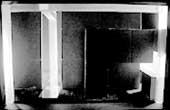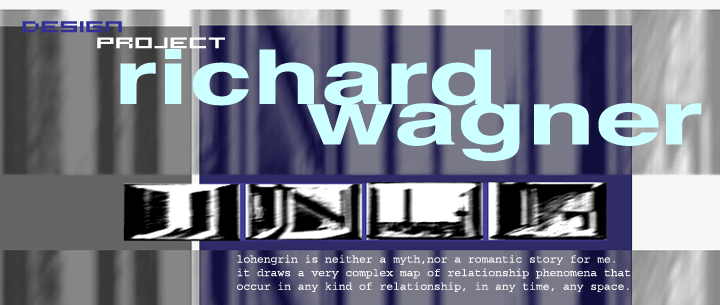|
|
in early stage, charcoal sketches are used to
present some
of my initial visualizations of Wagner's music.
Highly contrast
charcoal strokes portrait a chaos world, but
will be reduced to
an intimate space for the Swan Knight and Elsa.
|
|



|
As many believe, Wagner's
"Lohengrin" from an allegorical appeal, culled from
myth and legend figures. Swans, knight and veiled identity can
be viewed as the symbols of rescue, love, and faith, which are
common themes in the medieval literature.Therefore,most of the
design approaches to "Lohengrin" have been presenting
a romantic vision, with a mix of history and myth. Thus, the opera
"Lohengrin" becomes a deeply emotional romance of good
and evil and should be stage in romantic terms. However, I believe
that Wagner has much more to tell us about the nature of relationship
and the dialectics between relationships and other forces. "Lohengrin"
as I propose, can be an opera that explores the dynamics of relationships
between lovers, such as Lohengrin and Elsa. relatonship is an
unfinished business that never ends. We are always persons with
a past and a future. Both the past and future are somewhat uncertain
and dialogic in the sense that we always contemplate them through
our relationships with others. It is easy to see that the depth
or intimacy dimension of a relationship has been associated with
self-disclosure, self-revelation, and intimacy. The conflict between
Swan Knight and Elsa in the bridal chamber is such an argument
by which Elsa expects to know the most important self-revelent
and secret information from the Swan knight, that is, what is
Swan Knight 's real identity? Elsa feels, as her relationship
with the Swan Knight develops to a husband-wife level and as a
result of the increased intimacy, that she is legitimized to know
the Swan Knight's past. And this act of mutual revelation is validated
in the timing of a bridal night when Elsa and Swan Knight 's relationship
is in a turning point and will cover more intimacy. it is common
that people in intimate relationships often come to see one another
as an individual with a past to know more about another's past
give one more sense of understanding and trust. The emotive dimensions
are further linked with commitment, which is the expectation that
a relationship will continue into the future. How can one commit
him or herself to another without knowing his or her past? it
is unimaginable, and it is why Elsa wants to elicit the Swan Knight's
deepest secret, his veiled identity. Eventually, she "owns"
his past but in the cost that this information does not increase
the attraction of the Knight who is actually a "supernatural
power" rather, she hardly can deal with that information
which only caused her feeling of frustration and illusion. and
her illusion is necessary at this point because her future is
dialogically intertwined with the Swan Knight's past. Considering
that his past, as not being a human, does not reflect and even
is against a future of being her mundane husband, a role that
she probably expects him to be. As many argue that it is doubt
that invade Elsa's soul and thus she lost her love and innocence.
Such an opinion implicit ascribes that Elsa as a silly character
who is devoted to secrets testing.However, I see Elsa is such
a vivid and strategic person in the sense that her act of secret
testing is a gesture of affinity testing, an act of building intimacy,
and a strategic plan to make of a future. This is all to the good
and it is common among mundane people, between and within anyone
to whom we want to make a commitment. However, can we really own
one's past? do we have the right of and access to that kind of
ownership? and why? how do we deal with that past after we own
it? therefore "Lohengrin" is neither a myth nor a romantic
story for me. It draws a very complex map of relational phenomena
that occur in any kind of relationship, in any time and space.
The way it reveals the relational dilemma of mutual revelation
and interdependence in intimate relationship is almost modern,
universal and timeless. It proves,s somehow sadly, that all our
attempts to bring another closer are a necessary illusion at last.

/ back
|
|
|

